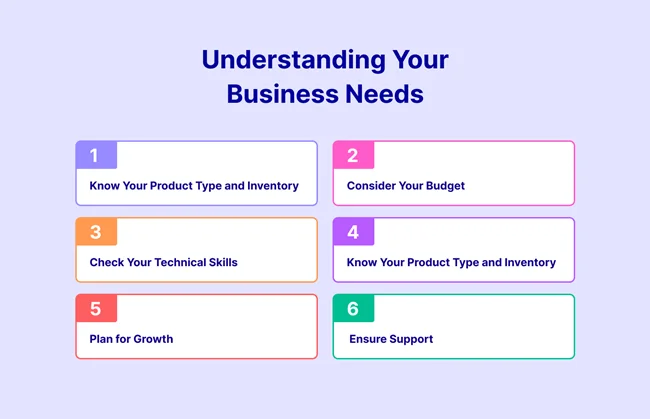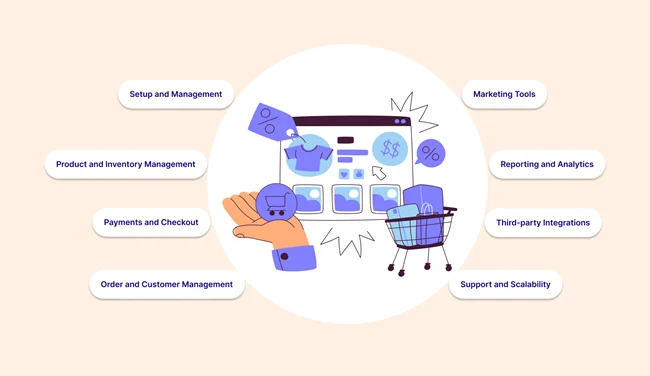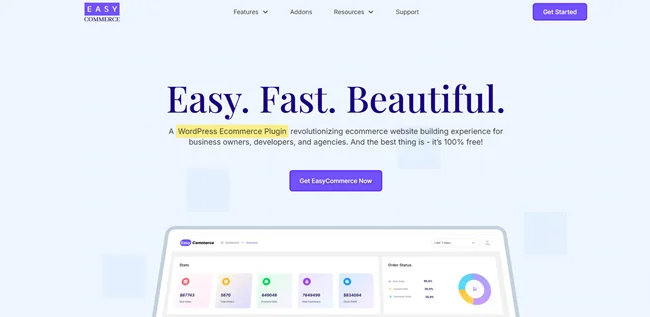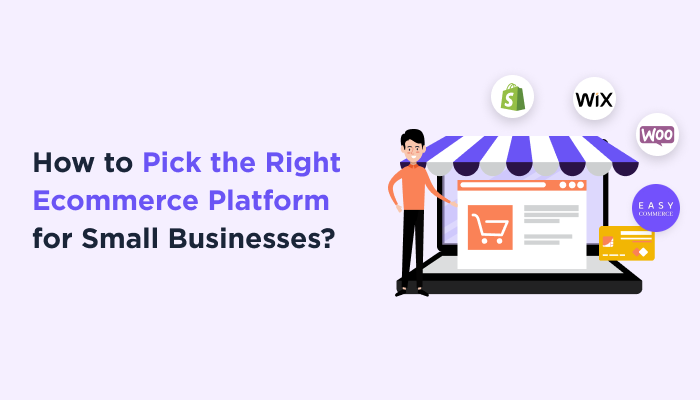How to Pick the Right Ecommerce Platform for Small Businesses?
So, you’ve decided to start a small business online and finally get all the logistics ready to attract a niche audience. All you need now is a good ecommerce platform for small business to kickstart your venture and bring your brand vision to life. If you’re new to the arena of ecommerce platforms, you will definitely need a helping hand to pinpoint which features are required for your business type.
Luckily for you, this blog explores how to choose an online ecommerce platform for small businesses or startups, including which features you need, the best platforms for the job, and how to plan for future growth.
Let’s get started!

With over 30.7 million ecommerce sites worldwide, the opportunity to stand out is slim but not impossible. Below is a checklist to help you understand how your business will function and thrive online.
If you’re selling physical products, EasyCommerce or Shopify may be the best option. However, for digital products and subscriptions, WooCommerce or Easy Digital Downloads (EDD) can be a good choice.
The complexity of your inventory is also worth considering. Because while most platforms can handle smaller inventories, only some can handle larger ones with multiple variants.
However, this isn’t always the case. Platforms like EasyCommerce can get you started with under $100, due to the open-source nature of WordPress. Shopify or BigCommerce may require more upfront investment.
So, you need to narrow down how much you can spend on the platform itself. Here’s a guide on WordPress ecommerce website cost to help you allocate your budget better.
While EasyCommerce, Wix, and Squarespace are much easier and way more beginner-friendly.
But if you plan to scale your business from your ecommerce site, you need to find an option that can handle high traffic and large catalogues without slowing down.
Marketing needs for small businesses may include: email marketing, social media and content integrations, and SEO optimization tools.
On the other hand, you can also leverage the community support and documentation. Premium plugins have an option of dedicated and priority support, thus, you can choose such ecommerce platform for your small business.
Pro Tip: Once you’ve chosen a platform, test out the interface, create a mock store, and take a closer look at the details to see if they align with your goals.

Let’s find out which features you should check for your small business –
Here’s a detailed blog on the best ecommerce platforms for small businesses to give you a broader idea of the matter.

Price: Free to use; domain, hosting, themes, and addons may incur costs.
EasyCommerce is an all-in-one WordPress ecommerce plugin that turns your basic site into a full-fledged online store. It comes with all the essential tools built in to help launch your small business online in under an hour.
If you consider the features we’ve mentioned above, EasyCommerce fills most of these criteria. With a user-friendly dashboard, customizable designs, easy product and variation uploads, multiple payment gateways, real-time sales reports, abandoned cart recovery, and much more, you can easily build a thriving small business with a budget of next to nothing.
You can also sell digital downloads alongside physical products, from the same easy-to-follow interface. And because of the open-source nature of WordPress, you can use its massive library of plugins and third-party add-ons to integrate almost any functionality into your store.
EasyCommerce is built with API-first data processing, so you won’t have to stress about bloating your website with third-party apps. It will continue to work at top speed even with a growing catalogue and during high traffic times.
However, this plugin is relatively new. Certain exclusive functionalities are under development. Thus, it’s a great choice if you want to grow alongside the platform.

Price: Starts from $29/month; plus additional costs for apps, themes, and transaction fees.
If you want a polished-looking store for your small business, Shopify provides a turnkey setup that makes website development accessible for non-technical users. It takes care of hosting, security, and updates, so you can focus on selling rather than troubleshooting.
Shopify has a clean interface and a huge app store, so you can quickly add features like subscriptions, loyalty programs, or custom shipping rules. You will also get built-in tools for payment, inventory, and marketing, so it works as a one-stop shop for entrepreneurs.
That being said, Shopify is perfect and easy to start with. However, with the transaction fees, premium apps, and theme upgrades, it can require further investments.
In order to tweak your store beyond its basic theme, you might need to hire a developer or learn coding. For the purpose of blogging and SEO, choose WordPress rather than Shopify for its robust feature set.
All in all, Shopify is great if you need a basic store built with a limited budget and technical knowledge.

Price: Starts from $17/month, with additional costs for transaction fees.
Another great beginner-friendly option for small businesses, Wix is a complete platform that handles hosting, security, and updates automatically for entrepreneurs who want a hands-off solution. You can use its intuitive drag-and-drop editor and its library of stylish templates to create a visually stunning website for your specific brand niche.
You also get built-in marketing tools, like email campaigns and social integrations, which are especially handy in attracting the right audience when you’re just starting.
However, it’s pretty limited in terms of scalability and integrations. Because it’s a website builder, and not a dedicated ecommerce platform, features like advanced inventory management or multi-channel selling aren’t as powerful or intuitive.
It also doesn’t have a massive app ecosystem like EasyCommerce or Shopify, so you might hit roadblocks if your business eventually needs to grow. All in all, Wix is a great option if you need a simple store with basic ecommerce features.
Here’s a detailed blog on the best ecommerce platforms for small businesses to give you a broader idea of the matter.
Before committing, take advantage of free trials, test the features that matter most to your business, and think long-term. After all, switching platforms later can be a hassle, so it’s worth getting it right from the start.
Luckily for you, this blog explores how to choose an online ecommerce platform for small businesses or startups, including which features you need, the best platforms for the job, and how to plan for future growth.
Let’s get started!
Understanding Your Business Needs to Choose the Right ECommerce Platform for Small Business
To find the right ecommerce platform to host your business, you must determine what it needs to carve out a niche.
With over 30.7 million ecommerce sites worldwide, the opportunity to stand out is slim but not impossible. Below is a checklist to help you understand how your business will function and thrive online.
Know Your Product Type and Inventory
Let’s start with what type of product you want to sell and how big your catalogue will be. Are you selling physical, digital, or subscriptions?If you’re selling physical products, EasyCommerce or Shopify may be the best option. However, for digital products and subscriptions, WooCommerce or Easy Digital Downloads (EDD) can be a good choice.
The complexity of your inventory is also worth considering. Because while most platforms can handle smaller inventories, only some can handle larger ones with multiple variants.
Consider Your Budget for an Ecommerce Platform
Even if your business is small, budgeting is always a big concern. And the quality of the platform often hinges on how much you want to invest in it.However, this isn’t always the case. Platforms like EasyCommerce can get you started with under $100, due to the open-source nature of WordPress. Shopify or BigCommerce may require more upfront investment.
So, you need to narrow down how much you can spend on the platform itself. Here’s a guide on WordPress ecommerce website cost to help you allocate your budget better.
Check Your Technical Skills
Some of the ecommerce platform for small business require more technical experience than others. These tools can provide you with better control and higher customization by performing some coding functions.While EasyCommerce, Wix, and Squarespace are much easier and way more beginner-friendly.
Plan for Growth
If you’re using your website as an additional portal to streamline customer orders, then a simple platform might work fine.But if you plan to scale your business from your ecommerce site, you need to find an option that can handle high traffic and large catalogues without slowing down.
Look for Marketing Tools
Some of the ecommerce platform for small business offer built-in marketing automation tools, while others require you to pay extra for it.Marketing needs for small businesses may include: email marketing, social media and content integrations, and SEO optimization tools.
Ensure Support
To solve all your queries in an instant, you need amazing support. Some plugins and tools might provide free support, while it’s a premium feature in others. For instance, to get professional support with WooCommerce, you need to invest a specific amount.On the other hand, you can also leverage the community support and documentation. Premium plugins have an option of dedicated and priority support, thus, you can choose such ecommerce platform for your small business.
Pro Tip: Once you’ve chosen a platform, test out the interface, create a mock store, and take a closer look at the details to see if they align with your goals.
Key Features To Look For In an Ecommerce Platform For Small Businesses
For your small business to thrive, you must look out for the following exclusive features in your ecommerce platform.
Let’s find out which features you should check for your small business –
1. Setup and Management
Choose the platforms that can easily automate the setup and management of an ecommerce store. This will help you have a head start in your journey.- User-friendly dashboard: An intuitive and actionable dashboard can walk you through the steps for setting up your store, and help you manage your products, orders, and settings without confusing technical barriers.
- Customizable themes: Branding can make or break customer retention, look for platforms that offer pre-designed templates for different industries and product types.
- Mobile-responsive design: With 10% of all retail purchases expected to come from mobile devices in 2025, you must invest in a platform that works seamlessly on smaller screens.
- Multi-channel selling: If you already have an established audience on marketplaces (Amazon, eBay) or social platforms (Instagram, Facebook Shops), capitalize on it by syncing them with your online store.
2. Product and Inventory Management
At the end of the day, it all boils down to how the platform can handle your products and stock. There are a few features to help minimize your efforts.- Easy product uploads: The process of uploading products has to be seamless and easy to follow. Look for bulk upload tools via CSV import/exports.
- Inventory tracking: Check for low-stock alerts that let you set a limit for when your inventory runs low.
- Product variations: Easily set variations to your products like size, colors, materials, and more.
- Digital downloads: Some platforms let you sell digital downloads (eBooks, software, subscriptions) alongside physical products. But check whether this feature is free or not.
3. Payments and Checkout of the ECommerce Platform
The payment and checkout process must be smooth as butter. This is a known spot where customers fall off and thus, you must optimize this specifically.- Multiple payment gateways: While Stripe and PayPal are essential to have, you also need to ensure you have local payment methods integrated.
- Transaction fees: There are certain transaction fees associated with each platform. Check their details to ensure that you opt for a gateway with minimal processing and transaction fees.
- One-page checkout: Single page checkouts boost conversions rapidly. Thus, ensure that you provide a mobile-friendly one-page checkout.
4. Order & Customer Management
Automating orders and customer management makes the process a breeze! It limits all the errors and helps you focus on fulfilling the orders and customer requests. So, check whether your ecommerce platform provides the following for smooth business management.- Order tracking: Choose a tool that provides a built-in centralized order system that helps order tracking smoothly.
- Email notifications: Keeping the customer updated on an order is essential in building a professional and trustworthy brand. Sending and customizing these emails has to be effortless.
- Product Reviews: Not every platform allows customers to leave reviews on products, so look for ones that do (without extra costs).
5. Marketing Tools
While platforms love to market AI-powered sales, bringing in sales takes time and effort, and a bit of automation from the right platform.- Discounts/coupons: This is a basic feature, but advanced segmentation usually requires third-party apps. See if this feature has all the required customization functions.
- SEO features: Check if you can customize URLS, meta tags, and optimize images with alt texts. You can also use WordPress speed optimization tips to improve your site’s loading.
- Abandoned cart recovery: This feature lets you detect when customers fall off during purchasing, and send reminder emails to encourage them to finish their order. A critical tool to have, but some platforms charge per email sent.
6. Reporting and Analytics
This is undoubtedly one of the helpful features for running a successful business. Real-time reports of your sales number helps you immensely in smooth marketing decision making.- Sales reports: Some platforms let you track revenue, top products, and overall sales for free. Ensure that you get exclusively updated and real-time reports.
- Google Analytics integration: While this is less reliable post-GA4, having analytics integrated on your store can help you make data-driven marketing decisions.
7. Third-party Integrations
To build a perfect online store and a brand, you need the right features, tools, and designs. This is where third-party apps and add-ons come in handy.- App ecosystems: The app library of an ecommerce platform reflects how well the platform handles integrations. With the right set of plugins, you can create a smooth ecosystem.
- Native integrations: Look for apps or add-ons that are native to the platform (and work as profit drivers), and test how well they work for your store.
8. Support and Scalability
Based on the plan of your choice, you get support from the platform’s team. Thus, ensure that you have active support and they are experts in solving all the issues with the tool.- 24/7 support: Chatbots and dedicated support are often included with free or entry-tier pricing plans. Only premium plans include round-the-clock support.
- Scalability features: “Unlimited products” sounds great until server costs balloon for resource-heavy sites. So, it’s up to you to verify these claims.
Some of the Best Ecommerce Platforms for Small Businesses
Now that you know that not all platforms are built to align with the operational workflows of small businesses, let’s look at which options are ideal for this purpose.Here’s a detailed blog on the best ecommerce platforms for small businesses to give you a broader idea of the matter.
EasyCommerce

Price: Free to use; domain, hosting, themes, and addons may incur costs.
EasyCommerce is an all-in-one WordPress ecommerce plugin that turns your basic site into a full-fledged online store. It comes with all the essential tools built in to help launch your small business online in under an hour.
If you consider the features we’ve mentioned above, EasyCommerce fills most of these criteria. With a user-friendly dashboard, customizable designs, easy product and variation uploads, multiple payment gateways, real-time sales reports, abandoned cart recovery, and much more, you can easily build a thriving small business with a budget of next to nothing.
You can also sell digital downloads alongside physical products, from the same easy-to-follow interface. And because of the open-source nature of WordPress, you can use its massive library of plugins and third-party add-ons to integrate almost any functionality into your store.
EasyCommerce is built with API-first data processing, so you won’t have to stress about bloating your website with third-party apps. It will continue to work at top speed even with a growing catalogue and during high traffic times.
However, this plugin is relatively new. Certain exclusive functionalities are under development. Thus, it’s a great choice if you want to grow alongside the platform.
Shopify

Price: Starts from $29/month; plus additional costs for apps, themes, and transaction fees.
If you want a polished-looking store for your small business, Shopify provides a turnkey setup that makes website development accessible for non-technical users. It takes care of hosting, security, and updates, so you can focus on selling rather than troubleshooting.
Shopify has a clean interface and a huge app store, so you can quickly add features like subscriptions, loyalty programs, or custom shipping rules. You will also get built-in tools for payment, inventory, and marketing, so it works as a one-stop shop for entrepreneurs.
That being said, Shopify is perfect and easy to start with. However, with the transaction fees, premium apps, and theme upgrades, it can require further investments.
In order to tweak your store beyond its basic theme, you might need to hire a developer or learn coding. For the purpose of blogging and SEO, choose WordPress rather than Shopify for its robust feature set.
All in all, Shopify is great if you need a basic store built with a limited budget and technical knowledge.
Wix

Price: Starts from $17/month, with additional costs for transaction fees.
Another great beginner-friendly option for small businesses, Wix is a complete platform that handles hosting, security, and updates automatically for entrepreneurs who want a hands-off solution. You can use its intuitive drag-and-drop editor and its library of stylish templates to create a visually stunning website for your specific brand niche.
You also get built-in marketing tools, like email campaigns and social integrations, which are especially handy in attracting the right audience when you’re just starting.
However, it’s pretty limited in terms of scalability and integrations. Because it’s a website builder, and not a dedicated ecommerce platform, features like advanced inventory management or multi-channel selling aren’t as powerful or intuitive.
It also doesn’t have a massive app ecosystem like EasyCommerce or Shopify, so you might hit roadblocks if your business eventually needs to grow. All in all, Wix is a great option if you need a simple store with basic ecommerce features.
Here’s a detailed blog on the best ecommerce platforms for small businesses to give you a broader idea of the matter.
Wrapping Up
If you’re here to learn how to choose the right online ecommerce platform for small businesses, we recommend finding a balance between ease of use with room to grow.Before committing, take advantage of free trials, test the features that matter most to your business, and think long-term. After all, switching platforms later can be a hassle, so it’s worth getting it right from the start.

